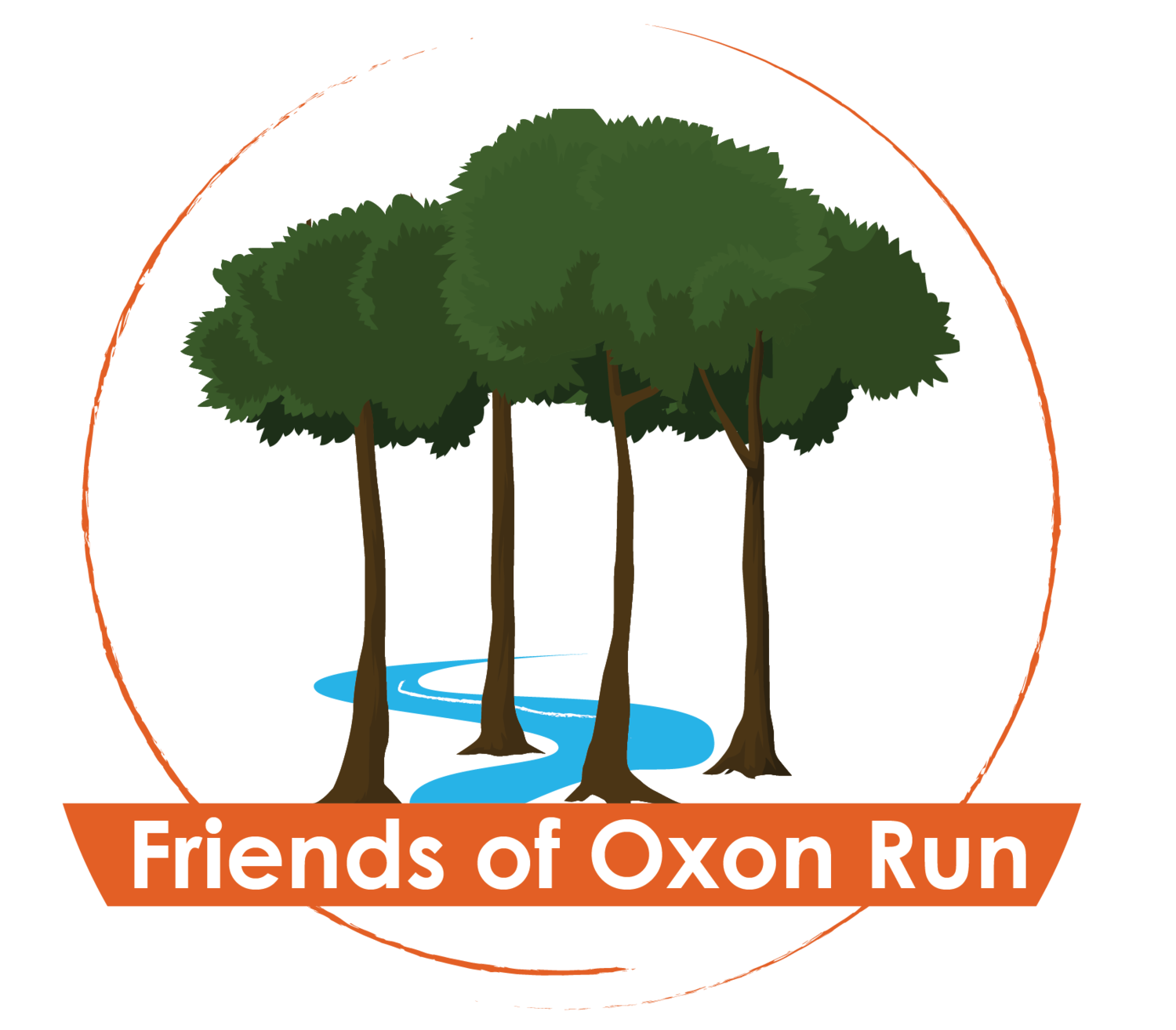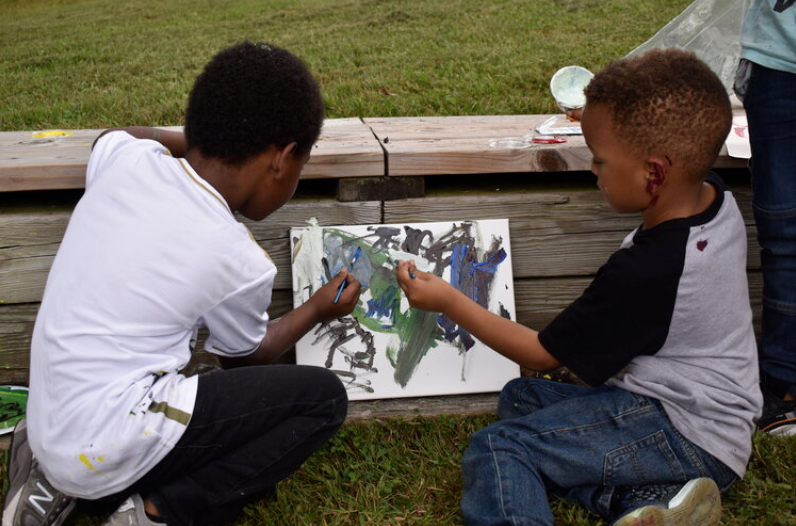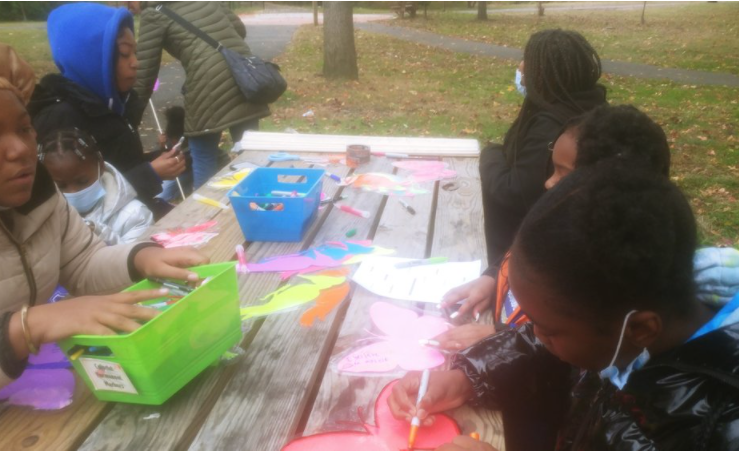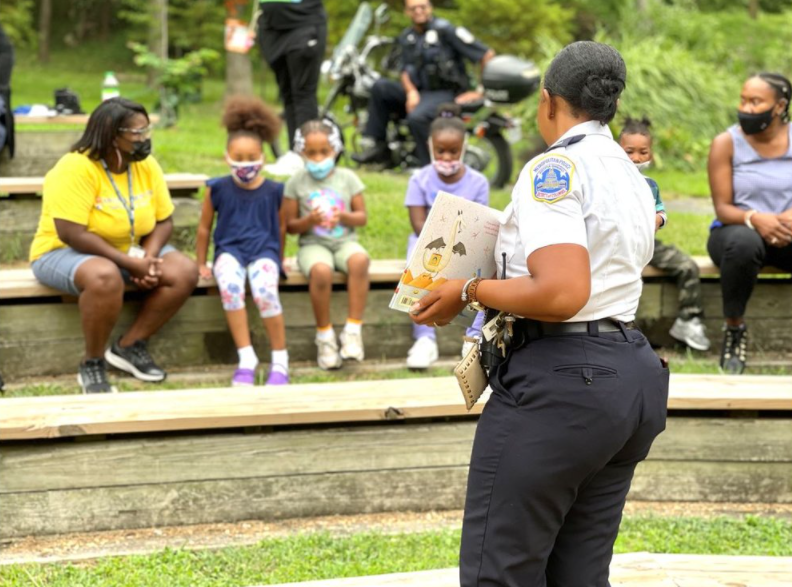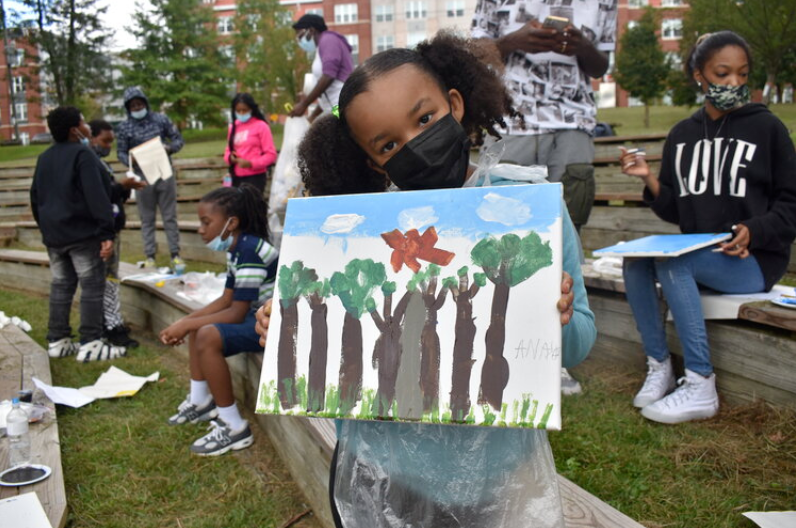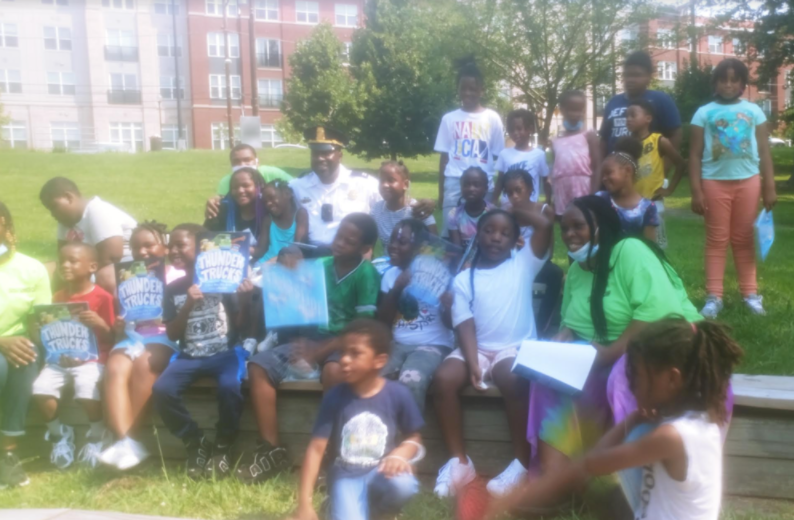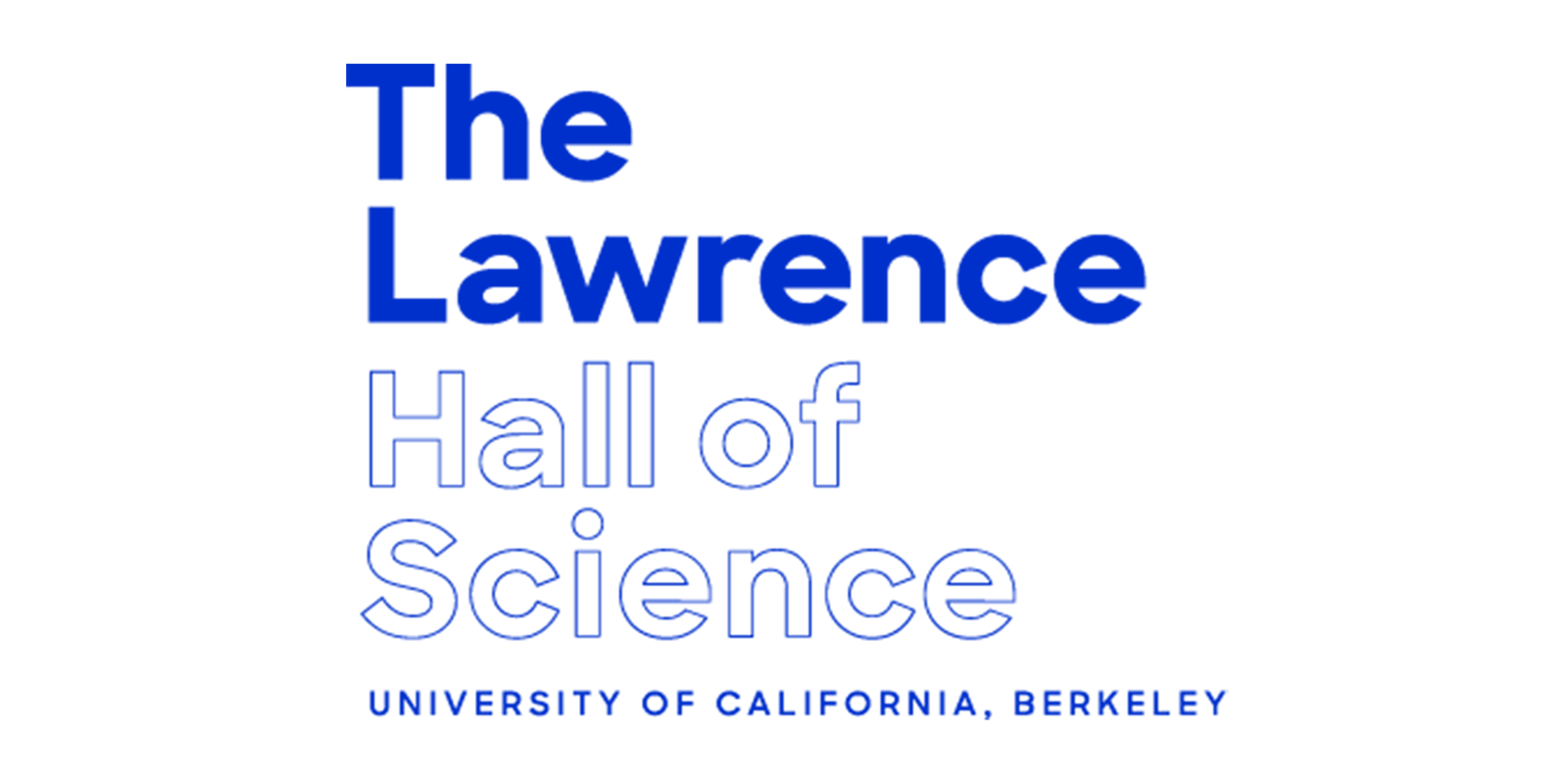Friends of Oxon Run Park
Washington, DC
The mission of Friends of Oxon Run Park (FOR), a non-profit in Washington, DC is to help preserve and conserve open space in the Ward 8 community. When schools were closed during the pandemic, the organization noticed a need to offer enriching and joyful outdoor programming, and Oxon Run Park proved to be the perfect venue.
Since November 2020, FOR has offered unique programming that has activated the park. Just being in the park and in nature has given families solace, young kids an opportunity to attend fun and education programming that helps them connect with the outdoors, and the community a place to find healing and connection.
The Friends of Oxon Run Park plans to continue this critical work that inspires connections between community, nature, mental health, and joy.
Below is an interview with the organization Vice Chair, Brenda Richardson, as well as more information about how the Friends of Oxon Run Park, with support from the DC Coalition for Equitable Outdoor Education, promoted outdoor learning during the pandemic.
About Friends of Oxon Run Park and Ward 8
Friends of Oxon Run Park (FOR) is a 501c3 non-profit.
It was formed in 2017 through an agreement with the D.C. Department of Parks and Recreation.
FOR’s mission is “to address the needs of conservation of natural resources and preservation of green space in Ward 8.”
FOR’s work is led by Absalom Jordan, Chair and Brenda Lee Richardson, Vice Chair.
Oxon Run Park is the largest property in the DC Department of Parks and Recreation system at about 128 acres and 3 miles long. It is home to “Legacy Cherry Blossom Trees” which were clones from trees gifted as a sign of friendship from the city of Tokyo.
See more in their brochures on FOR’s mission and background.
Location
Washington, DC, specifically the community of Ward 8, which has about 80,500 residents and over 30 schools.
Ward 8 is the southern-most ward in DC, between the Potomac and Anacostia Rivers. It is a predominantly African American community with a rich history and cultural heritage that includes the Frederick Douglass National Historic Site, the African American Heritage Trail, the Big Chair, and the Smithsonian Anacostia Community Museum.
Ward 8 has some health and socio-economic concerns. Compared with all other DC wards, Ward 8’s median income is 38% lower, the percent of families in poverty is almost twice as high, and the homicide rate is also twice as high.
Climate
“Humid subtropical” climate with occasional “nor’easters” storms.
Plant hardiness zone 8a
Mildly cold winters: 32°F - 40°F
Hot, humid summers: 80°F - 100°F
Snowfall: 15.5” per year
*Sources: Ward 8 – Profile of Health and Socio-Economic Indicators. 2002. District of Columbia Department of Public Health; Friends of Oxon Run Park: History; and NOAA.
Interview with the Friends of Oxon Run Park
In October 2021, Brenda Richardson, Vice Chair of Friends of Oxon Run Park, shared a conversation with Green Schoolyards America staff, Lauren McKenna and Nancy Striniste, about how her community jumped to action to provide outdoor programming at the park during the pandemic.
Green Schoolyards America: Tell us about yourself, your background and how you came to be an activist.
Brenda Richardson: I am an eco-feminist and a strong believer in nurturing Mother Earth because she takes good care of us if we take good care of her!
I got into this field because I found that people in disfavored communities of color, often do not consider outdoor learning and being in nature, because they're caught up in things like keeping a roof over their heads, feeding their kids, and dodging bullets.
I got involved with the Friends of Oxon Run Park, because I saw this picture of our community on life support when I was doing some forest bathing with a friend [Melanie Chokus-Bradley, premier forest bathing guide in DC and author of several books on the subject]. I feel like the park is our hospital and the trees and the birds are our IV, helping us to recover so that we're no longer on life support.
GSA: Tell us about the community of Ward 8 in DC.
BR: I like to call Ward 8 a “Renaissance” community. We're a community of many single mothers that are heads of households. We are the ward with the second largest number of children. Our Ward is also number one in health disparities, highest rate of unemployment, and lot of people who live below the poverty line.
But you know what, we're people that strive to thrive. Even though we're the “walking wounded” — because of the pandemic and the escalation of violence — in our walking and in our woundedness, we are witnessing the good and the bad. And the goal of the Friends of Oxon Run Park is to help them witness the good through nature and through outdoor learning.
GSA: It is clear from that description of Ward 8 that you love this community very much! Tell us about Friends of Oxon Run Park and your Outdoor Learning Initiative. How did it come to be? What were your goals?
BR: The Friends of Oxon Run Park was coming to be for quite some time. I used to be the Deputy Chief of Staff for Councilmember Marion Barry, and under his leadership, the Parks and Green Space Council was established. Absalom “Ab” Jordan, who was also the co-chair of that council, is also the current chair of the Friends of Oxon Run.
After Councilmember Barry passed away, Ab decided that he wanted to stay involved with Oxon Run Park — in particular because it's the largest park in the city's inventory. The beauty of this is it's in our community of Ward 8, of all places! Our goal is to preserve green space. The development community has a tendency to swap land and take advantage of [open spaces]. The Friends of Oxon Run Park wants to be a gatekeeper to make sure that that doesn't happen. It's important to protect our parks because it's a part of our heritage, it's a part of our culture.
GSA: How big is Friends of Oxon Run Park? Are involved in any partnerships?
BR: It is just myself (Brenda) and Ab Jordan, but we love establishing partnerships! For example, when we did the story time with MPD (Metropolitan Police Department), the public library donated books to every child, so they could start to build a library in their own homes.
“The goal of the Friends of Oxon Run Park is to help them witness the good through nature and through outdoor learning.”
Fun Events at Oxon Run Park
GSA: Tell us about the events you’ve been hosting in the park and around the city.
BR: The Outdoor Learning Initiative and Oxon Run Park started as a result of the DC Coalition for Equitable Outdoor Education. We became a member and were a part of all these meetings. They were encouraging somebody to do something, so I said, “Okay I'll do it!”
We had that first outdoor learning event in November of 2020, and it was a raptor presentation. A falconer from the Chesapeake Bay foundation did a presentation on kestrels. The kids loved it. I loved seeing our kids in an amphitheater outside, raising their hands like they're in a classroom. That was really special to us because it meant that they were paying attention. So I said to myself, “Brenda, now you have to do something once a month!”
GSA: What has been the impact of those events on kids and families and on schools in your community? Who and how many attended?
BR: The biggest impact was not only educational. It impacted their mental health. At the time, the kids couldn't go to school [due to COVID restrictions]. Some of the parents were saying how their kids were bouncing off the walls at home. The kids were stressed out and the parents were stressed out.
This was a wonderful opportunity for families to come and let their kids learn and have fun. The parents also found some solace as well, just [being there in nature]. When you are in nature, you're not stressed out and you can be at peace. It was just to help them address their stress that they found in their household at a magnitude that they had never anticipated.
Most of the [attendees] were repeats. We had 15 families that came consistently.
Above: Storytime with Metropolitan Police Department.
“This was a wonderful opportunity for families to come and let their kids learn and have fun. The parents also found some solace as well... When you are in nature, you’re not stressed out and you can be at peace.”
Other Fun Events
Math and Music
BR: “One parent said her daughter hated math, but as a result of her being a part of Music and Math, she improved dramatically in her math class when she went back to school because the cellist and drummer at the event made it fun, and she wasn't afraid of it anymore.”
Wriggle Into Spring With Worms
BR: “The Audubon Society volunteered their time and brought worms, telescopes, and little shovels. The kids were looking for worms and looked at them through the microscope and then drew a picture of what they saw. That was so rewarding. There was one mom who was on her knees helping her kids dig for worms, too. The beauty of that was we were able to engage the parents as well.”
Exploring Science and Rain Gardens
BR: “It was January and the amphitheater was covered with snow! I put my head down thinking, “This isn’t going to happen unless we get the police here to shovel the snow.” Well, by the time they got there, the kids were there, too. The kids grabbed some of the shovels and helped them shovel the snow off the amphitheater. A lot of the kids were from the Urban Adventure Squad (a D.C.-based non-profit that offers neighborhood-based, hands-on outdoor learning programs). It was so heartwarming to see the kids, in spite of the cold, having a great educational experience in the process. That's one of my favorite moments of our outdoor learning.”
See more photos of their past events — such as Story Time with MPD, Story Time & Poe-tree, and a Fashion Show — on their website HERE.
Challenges, Successes and Surprise Joys
“The Friends of Oxon Run Park love doing this work... we love connecting the community to nature!”
Above: Story time with MPD.
GSA: What challenges did you face and how did you deal with them regarding weather, programming, getting the word out, attendance, or other issues?
BR: We went door to door on both sides of the park. The park is 2.7 miles, so there were lots of apartment complexes and homeowners. It was important to us that families knew what was going on, so they could take advantage of the opportunity.
We found out that [some] people didn't come [to the park] because they were afraid. There's this sense of fear that kind of hovers over our community, even though the park is just a beautiful park with a wonderful trail. There is this fear that somebody could be hiding somewhere or something could happen to me and I think it's just indicative of this community. Also, [some people] were driving on the trails, using the trails as a roadway, parking anywhere in the park! So people were afraid for their children's safety.
We are working on that, and so we did do something about it. We did story time with the Metropolitan Police Department (MPD) in the park [in partnership with the DC Coalition for Equitable Outdoor Learning]. Sixty kids showed up! [Likely because] they felt safe.
[Helping people feel safe and comfortable in the park is something we are working on.] I think [that’s true] the more we activate the park. If you see people walking their dogs, running on the trail, sitting in the Mother's Peace Garden, the more likely others will, too.
The Friends of Oxon Run Park love doing this work... we love connecting the community to nature!
Shifting the Mindset about Outdoor Spaces and Mental Health
GSA: Please tell us how your experience with outdoor programs in the park shifted your or your community’s thinking about outdoor learning and its benefits and challenges. How will these events continue to shift people's mindset around the benefits of being outside of the park?
BR: Well, it did shift.
[Children would run ahead of their parents to the] amphitheater to participate in outdoor learning. I think that speaks volumes to their anxiousness to be a part of something special to them.
I think it also shifted when we also started to recognize that there was a mental health component.
So we started youth trauma breaks on the weekends, and even meditation for the parents. We wanted parents to have their space, too. The instructor had us in tears because we didn't realize how traumatized we were until somebody asked us, “How are you really doing?” Through our work in the park, we found out that other parents were going through the same thing that we were going through, which was comforting.
[Being engaged in outdoor learning together] made us better individuals and parents as we were going through this pandemic.
And we recently did [an anger management event] for boys. It just brought tears to my eyes, because there's this hostility that's like collateral damage from the pandemic. One teenager realized why he was acting the way he was […] and sometimes hit people: because no one had taken the time to help him address his mental health. […] This outdoor learning took it to a whole other level: now there is no limit to the topics you can explore when you have this outdoor venue and this conversation has been started.
You know, the pandemic may have been really, really bad, but it has blessed us with outdoor learning. And we had never experienced that before. And sometimes when we're sitting in the in the amphitheater, there are lizards all over the place. The kids are fascinated by the lizards in the park’s amphitheater. That means they're paying attention to their environment.
And I think that outdoor learning is just such a healthy form of education, especially when we're concerned about being contagious and being stressed out.
It’s a wonderful way to practice physical distancing, too!
“This outdoor learning took [addressing mental health] to a whole other level; now there is no limit to the topics you can explore when you have this outdoor venue and this conversation has been started.”
Love your Community, Love your Parks
“The parks are sacred ground... where we can heal. It’s a place where we can unite. And it’s a place where we can find joy when you least expect it. ”
GSA: Do you feel a sense of ownership of the park of the community helps the community care and love the park?
BR: Oh absolutely, because you invest in it!
We have some Park Stewards who volunteer for a year and help with social media and connecting with their peers. We’re learning through them how to connect with their generation. They're the ones that are going to be leading the community at some point, but we want them to be connected to nature and know how it feels and be able to articulate the benefits of it to others.
GSA: What advice do you have for others who are trying to activate their parks?
BR: First, work with whoever has jurisdiction over the park, whether it's the federal government or your local government.
Second, get social media savvy for community outreach. Knocking on doors was not as successful as we'd hoped. Our young Park Stewards said, “Miss Richardson, nobody reads a flyer!” They are helping us!
Third, we want people to want to be engaged, so ask what they would like to see their children learn, and form the programming around that.
What’s Next for Oxon Run Park
GSA: What’s next at Oxon Run, both during the pandemic and beyond?
BR: I would love to see peer-led outdoor learning, especially with the teenagers. They just seem so lost, you guys! And I don't know why, but you could see that there are little spirits just needing to be reignited. And you could see that each one of them had a special talent that nobody had tapped into. So, if we could, my dream is that the kids would take over the outdoor learning and make it something even more fabulous that it already is, and they can call it their own.
GSA: Is there anything else you want to share with us today?
BR: The parks are sacred ground. They are truly sacred ground, and it's our refuge. And it's a place where we can heal. It's a place where we can unite. And it's a place where we can find joy when you least expect it. So, embrace your parks and treasure them because they're a wonderful natural resource that Mother Earth has gifted us. And it's important for us to take care of them.
They're just so many people that are looking for green space [to activate]. One local artist melts bullets into artwork and hanging them in our trees in the park honor those who fall into gun violence. The urban forestry administration are creating food islands with nut trees and fruit trees and so that was a project for some of our kids. We created a Poetry Trail with everybody's poetry on a yard sign. As you're walking the trail, you could read their poetry.
We really love being able to think outside of the box!
Lastly, Sharon Danks and Green Schoolyards of America has just been magnificent. This is such a critical time in our history. And what you are doing is like pioneering trailblazing kind of work that will be here forever so thank you. We are so grateful to have you and the DC coalition as part of this.
More about Friends of Oxon Run Park
Community of Practice Presentation
Hear Brenda Richardson, Vice Chair of Friends of Oxon Run Park, present at the January 19, 2021 Community of Practice meeting. Skip to 15:16 for her presentation.
Media Coverage
Sprout it Out Spotlight: The Friends of Oxon Run (July 2021)
— District of Columbia Office of the State Superintendent of Education
A monthly e-newsletter for District school garden, farm to child nutrition programs, and environmental literacy efforts, by the District of Columbia Office of the State Superintendent of Education.
Friends of Oxon Run Podcast (Coming soon!)
CREDITS
This page features an October 2021 interview with Brenda Richardson, Vice Chair of Friends of Oxon Run Park, and Lauren McKenna, Program Manager, Green Schoolyards America, and Nancy Striniste, Director of East Coast Programs, Green Schoolyards America.
National COVID-19 Outdoor Learning Initiative
The National COVID-19 Outdoor Learning Initiative supports schools and districts around the country in their efforts to reopen safely and equitably using outdoor spaces as strategic, cost-effective solutions to increase capacity onsite and provide access to abundant fresh air. The Initiative seeks to equitably improve learning, mental and physical health, and happiness for children and adults using an affordable, time-tested outdoor approach to keeping schools open during a pandemic.



